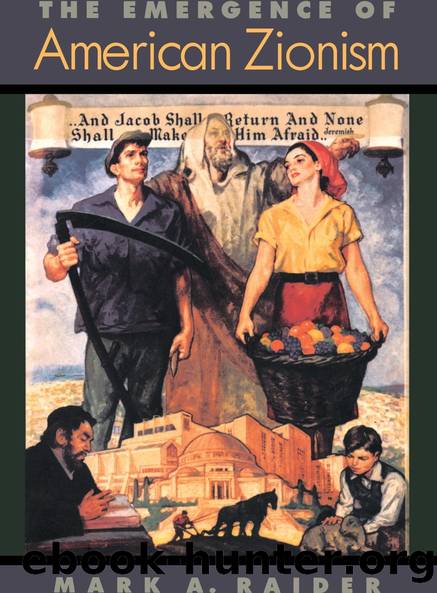The Emergence of American Zionism by Mark A. Raider

Author:Mark A. Raider [Raider, Mark A.]
Language: eng
Format: epub
Tags: History, Jewish, Social Science, Ethnic Studies, General
ISBN: 9780814774984
Google: 6hcUCgAAQBAJ
Publisher: NYU Press
Published: 1998-09-15T04:24:01+00:00
Hayim Greenberg also displayed a talent for voicing the ideological agenda of his time.19 In 1905, following the Kishinev pogrom, he coauthored a proclamation that was widely circulated by the Russian Zeirei Zion.20 At age seventeen, Greenberg made his debut as the youngest Russian Zionist delegate at the 1906 Helsingsfors Conference, where resolutions favoring Gegenwartsarbeit as well as equal rights for Jews and other nationalities in the Russian Empire were adopted.21
Although in many respects he was philosophically akin to Kaplan and Kallen, Greenberg differed significantly from them in his personal development and ideological orientation. Born in Todoristi, Bessarabia, Greenberg grew up in the twilight of the Romanov dynasty. He never received any religious training or a formal secular education, but he did possess a passion for learning and taught himself to read and write Yiddish, Hebrew, and Russian (as well as German and English in his adult years). As a result of his autodidactic proclivity and voracious reading habits, Greenberg acquired a broadly based Jewish and general education.
In the uncertain and turbulent period that followed the Bolshevik revolution, Greenberg remained faithful to a combination of Zionist and communist ideals. But he did so at enormous political and personal risk and was arrested on several occasions by the Soviet authorities.22 His last stand in Russia was in defense of Habimah (The Stage), a well-known Hebrew theater company in Moscow. When these efforts failed, the rising tide of Jewish âcultural attritionâ swept Greenberg, along with thousands of other Jewish radicals, out of the Soviet sphere.23
In 1921 Greenberg traveled to Berlin, joining other émigre intellectuals in this important center of Zionist activity, and there he matured as a Zionist thinker.24 His writings reveal the influence of religious neo-Judaism, originally propounded by the German master Hermann Cohen and later developed by Martin Buber and Franz Rosenzweig.25 Greenbergâs identity was also shaped by opposition to certain prevailing trends in Jewish and Zionist thought.26 He rejected antimodernist rabbinic sentiment as anachronistic and classical Reform as superficial. At the same time, he dismissed the rigid Zionist dogmatism of shlilat hagolah (negation of the exile) and posited a supportive approach to Jewish life in the diaspora. For Greenberg, Zionism was the synthesis of Judaism and national revival.
Philosophically, Greenberg was closest to Chaim Arlosoroff, a Russian emigre like himself, who completed his formal education in Berlin. Arlosoroff, a cofounder of the German branch of Zeirei Zionâwhich was known in Palestine as Hapoel Hazair (The Young Worker)âemerged in this period as a rising star of Zionist politics and a brilliant economist. Like Greenberg, Arlosoroff was inspired by A. D. Gordonâs cosmic vision of physical toil and national redemption, especially the voluntaristic notion of kibush haavodah (the conquest of labor).27 The very terminology, with its layers of unfolding meaningâavodah, the Hebrew word for âlabor,â is also the classical term for worshipâtapped an idealistic vein in the radical east European Jewish milieu of the period. Kibush haavodah symbolized the complete transformation of Jewish life.28
Even though Arlosoroff drew much from Gordonâs philosophy, his Zionist thinking was also substantially shaped by the scientific rigors of the German academy.
Download
This site does not store any files on its server. We only index and link to content provided by other sites. Please contact the content providers to delete copyright contents if any and email us, we'll remove relevant links or contents immediately.
| Haggadah | Hasidism |
| History | Holidays |
| Jewish Life | Kabbalah & Mysticism |
| Law | Movements |
| Prayerbooks | Sacred Writings |
| Sermons | Theology |
| Women & Judaism |
The Power of Habit by Charles Duhigg(3130)
Man's Search for Meaning by Viktor E. Frankl(2670)
Mckeown, Greg - Essentialism: The Disciplined Pursuit of Less by Mckeown Greg(2440)
MOSES THE EGYPTIAN by Jan Assmann(2412)
Devil, The by Almond Philip C(2326)
The Complete Dead Sea Scrolls in English (7th Edition) (Penguin Classics) by Geza Vermes(2277)
Unbound by Arlene Stein(2268)
I Capture the Castle by Dodie Smith(2034)
Schindler's Ark by Thomas Keneally(1879)
The Invisible Wall by Harry Bernstein(1799)
The Gnostic Gospel of St. Thomas by Tau Malachi(1794)
The Bible Doesn't Say That by Dr. Joel M. Hoffman(1677)
The Secret Doctrine of the Kabbalah by Leonora Leet(1607)
Political Theology by Carl Schmitt(1579)
The Jewish State by Theodor Herzl(1533)
A History of the Jews by Max I. Dimont(1529)
The Dead Sea Scrolls Bible by Martin G. Abegg(1513)
The Book of Separation by Tova Mirvis(1486)
Oy!: The Ultimate Book of Jewish Jokes by David Minkoff(1369)
